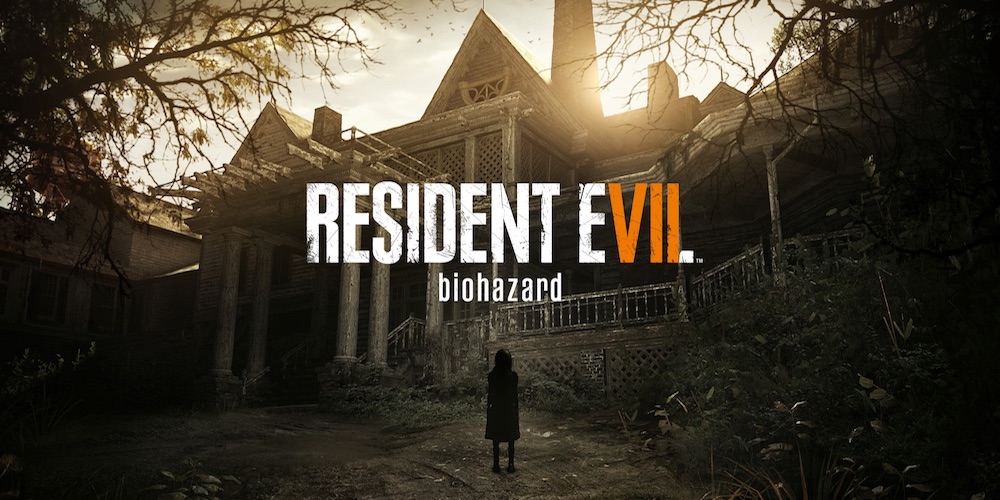
When Resident Evil 7: Biohazard (RE7) was first announced at E3 2016, a lot of core fans voiced concerns over the game’s bold new direction. The mainline series was already in dire straits after the critical failure of Resident Evil 6, and it didn’t help that the market had been saturated with mediocre first-person horror games in recent years. The demo Capcom released on the same day (Beginning Hour) also didn’t feature any combat, which stirred up a lot of online debate as to whether RE7 was just trying to capitalise on the controversy surrounding the cancellation of Silent Hills. Although, in hindsight, this was more than likely a marketing stunt as the demo received two updates in the following months which added several new areas, a brief glimpse into the enemies, weapons and combat, and VR compatibility.
Rest assured, RE7 is still a Resident Evil game through and through. In fact, it’s arguably more true to the roots of the series than anything released from Resident Evil 4 onward. For as much that has changed this time around, it’s also very clear the game is a callback to the original. Expect tense atmosphere, limited resources, inventory management, sandbox environments, open exploration, secrets, puzzles, weapon variety, insane boss fights, and what is possibly the least convoluted narrative in the mainline series yet. RE7 also single-handedly convinced me that a full-scale horror game can not only work in VR but work better. Nevertheless, if you’re STILL not happy with the new direction, I urge you to consider trying the Revelations sub-series instead, as third-person Resident Evil is still very much alive and well.

It’s important to clarify that RE7 is not a reboot, despite there being no obvious connections with the mainline series. The game takes place in 2017 (4 years after the events of Resident Evil 6) and is lead by a new protagonist, Ethan Winters, who is much more of an average Joe than those who came before him. The story opens with Ethan setting out to Dulvey, Louisiana after he receives a message from his missing wife, Mia, who’d been presumed dead 3 years earlier. It is on this trip that he finds himself searching a derelict plantation which also happens to be home to the relentlessly psychotic Baker family. While he manages to locate Mia, the situation turns out to be more sinister than he anticipated. Captured and tortured, Ethan manages to get away, but now must rescue Mia and escape the mansion.
RE7 is surprisingly one of the most accessible games in the Resident Evil universe so far, so it’s a great entry point for newcomers as well as older fans who fell off the wagon. That’s not to say the story isn’t mysterious or intriguing, it’s just not that difficult to follow, which is a refreshing change of pace for this series. Whereas the original games took inspiration from George Romero films, RE7 uses a different approach more akin to something like The Devil’s Rejects or Texas Chainsaw Massacre, at least when it comes to the characters and setting. Although, to sell it as that alone would be unfairly reductive as there are a wide array of influences and interesting ideas throughout. It’s actually one of my favourite stories in the series because of how well it holds up on its own while still connecting to the bigger picture.
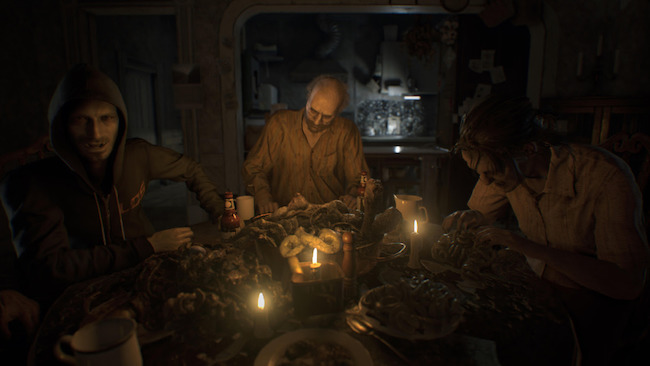
With RE7, Capcom essentially stripped Resident Evil down to its core to deliver a classic survival horror experience that’s built upon with modern design conventions. This isn’t a game where you’ll roundhouse kick your way through hordes of zombies, and it’s also not one where you’ll be left totally helpless to simply run and hide. It’s a game that understands how empowerment is supposed to work, providing the resources you need, but in limited quantities to ensure you’re cautious with how you use them. What this particular entry also handles well is a sense of progression, starting you out with basically nothing, and then consistently introducing new weapons and encounter types. This ensures you never get too comfortable while also developing your skills to take on an escalating series of challenges.
A lot of RE7’s strengths boil down to its environments, which are not only insanely detailed and visually stunning, but designed in a clever way to facilitate both exploration as well as more linear set piece moments. Unlike the Spencer Estate which is pristine and flash, the Baker Plantation is decrepit, gross, and equal parts unsettling and fascinating. I’m a fan of sandbox style games where you’re able to grow intimately familiar with your surroundings over time, and this is something RE7 absolutely nails. While playing, I always felt compelled to explore every square inch; hunting for items, new pathways, and memorising the layouts – something I feel is essential in a good survival horror game. There are plenty of staples which return, too, such as save rooms, locked doors with themed keys, and a variety of puzzles.
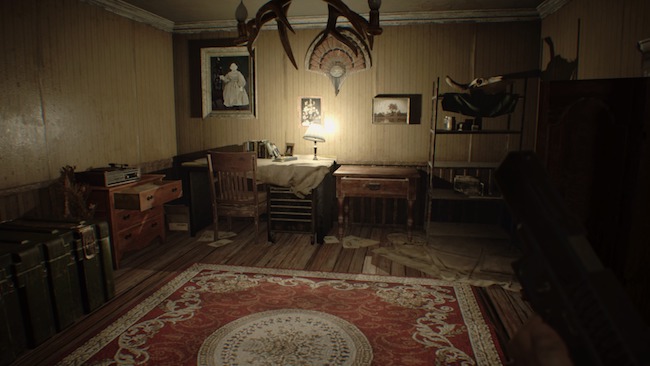
Save rooms are a system I was particularly thrilled to see make a return. RE7 does a phenomenal job in making you feel a sense of unease while playing, so having a guaranteed safe space to unwind is a vital part of the experience. Just like in earlier games, you’ll recognise these rooms by their eerily relaxing music, along with a tape recorder to save your progress (an homage to the series’ typewriters) and a storage box to manage your inventory. RE7 handles inventory similarly to the older games, as well. It’s pretty generous up front and can be upgraded, but still restrictive enough to ensure you carefully consider what you take with you. Herbs and gunpowder also make a return, which can be combined with chem fluids to create healing aids or bullets. As you’ll always need both, it’s a compelling trade-off.
While it’s great to see a lot of nostalgic influences in RE7’s design, there are still a couple of areas which underwhelm. The puzzles, in particular, are mostly average with only one exception being when you face off against Lucas. This segment is handled so incredibly well that it shines an ugly light on the mostly uninspired approach used everywhere else. I mean, the game practically re-uses the shotgun puzzle from the original (minus the closing walls). There are also only four variations of the Molded enemies you’ll encounter. Personally, I think they’re super effective, but I still can’t help but miss the creative fauna the series is renown for. The game is set in Louisiana, for Pete’s sake, and you don’t get to fight a single alligator, let alone some crazy mutated monster alligator. A few big bugs are about the extent of it.
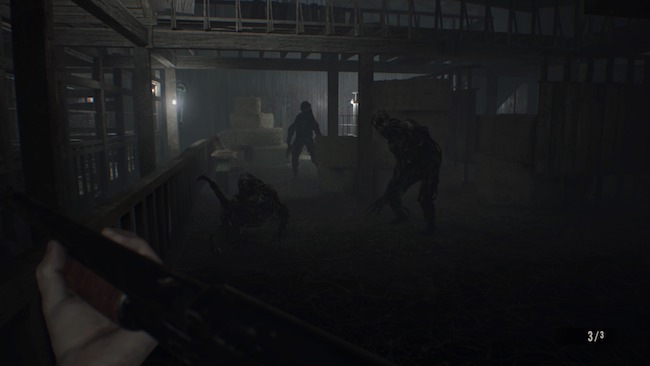
“Is the game actually scary, though?” A question I’m sure is sitting on the forefront of a lot of players minds. Resident Evil hasn’t been “scary” for a long time, and considering the change in perspective was justified as a means of taking the series back to its horror roots, I’m relieved to say yes, and for a variety of reasons. Whether you’re susceptible to horror or have grown desensitised from years of exposure, RE7 will satisfy. The underlining sense of anxiety combined with limited resources works exactly as you’d expect it to in a survival horror game, and with the first-person camera limiting your vision in lieu of fixed camera angles, it can be downright terrifying when you unexpectedly encounter an enemy. Especially if it’s one of the Bakers, who are easily the most iconic Resident Evil antagonists since the Nemesis.
Mechanically, RE7 is both well made and accessible, with gameplay that feels wonderfully meticulous. As a longtime fan, it’s exactly what I hoped it would be, and I appreciate the developers didn’t need to abandon combat to make you feel vulnerable. The Molded are mostly what you’d expect from zombie-esque enemies, although unique in that they only take solid form when you’re nearby. They’re formidable, and can easily cause you to waste bullets if you’re not careful. The Baker family, on the other hand, each deliver their own brand of horror. Jack is essentially a T-1000 Terminator, so it’s best to avoid him altogether. Marguerite is more manageable, but get too close and she’ll swam you with insects. Lucas, however, prefers to torment from afar, playing a Jigsaw role as he pits you against Saw-like traps.
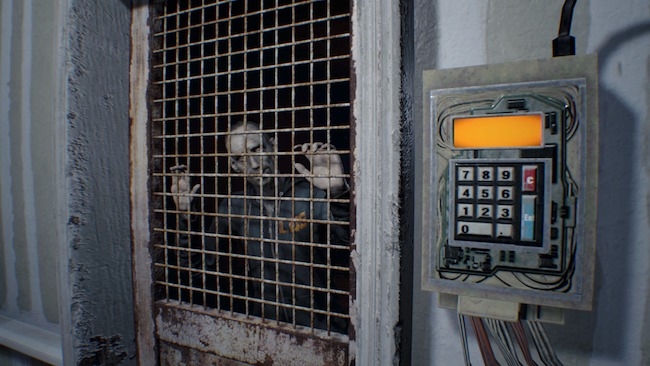
Much like with every Resident Evil game, you can expect to build up a generous arsenal of weaponry toward the end. From shotguns to flamethrowers and even chainsaws, RE7 doesn’t hold back. It’s just a matter of deciding when to bring them out, as ammo for the more powerful weapons is not always easy to come by. Each weapon feels unique and powerful, with the shotgun, in particular, being one of my favourites in the series so far. What probably surprised me most, however, are the boss fights. I wasn’t even sure there would be any given the change in direction, but there are, and they are amazing. It’s still mostly a case of bringing your best toys out to play, which is always a lot of fun, but you should also expect to more actively consider your environment and use it to your advantage when fighting a boss.
A new feature in RE7 I especially enjoyed are the collectable VHS tapes, which allow you to play through past events from another character’s perspective. There are only a handful in the game (so far), but I thought each had something interesting to offer. I’m also really keen on the idea of this being used as an expansion tool for future DLC, as it gives Capcom the creative freedom to add anything they want without compromising the game. If it’s replayability you’re looking for, though, look no further than “Madhouse Difficulty,” which is unlocked after you beat the game once. In this mode, enemies are stronger and faster, resources are scarcer, health regeneration is gone, items are moved around, and saving requires the use of collectable cassette tapes. If you’re a longtime fan, I highly recommend giving it a shot.
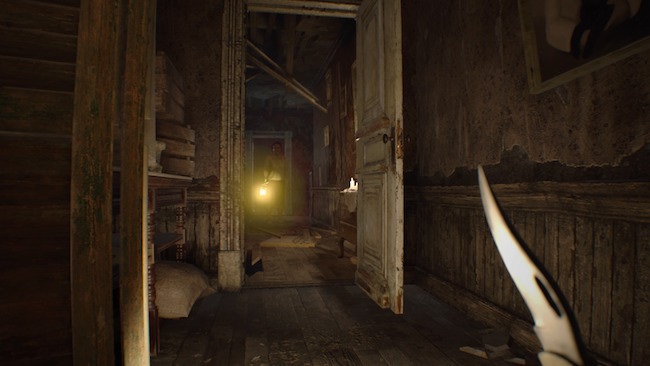
RE7 doesn’t just represent a return to form for the Resident Evil franchise, it’s also a significant leap for VR. Let me first preface my thoughts by saying the game looks absolutely phenomenal running across all platforms. Regardless of how you choose to play, you can expect to fully immerse yourself in the nightmarish terrors of the Baker Plantation. The music, sound design and voice acting are also top tier, and work in unison with an amazing art direction to deliver one of the most iconic horror experiences in years. As a hardened horror fan, however, experiencing RE7 in VR has consumed my thoughts and imagination with how immersive it can be. To a point where when I played it normally, I felt detached and as if I was in control of a weird interactive home video. There is honestly no comparison in my mind.
While the graphical compromises needed for VR can be off-putting at first, it’s easy to move past it once you become immersed in the game’s dank and gritty environments. It’s utterly fascinating how many smaller details you begin to pick up on, and how that fundamentally changes the way you interact with the world. Even tropes such as walking through neck-deep water or crawling through a small space can evoke a sense of dread. Despite its many successes, though, there are still a few barriers to overcome yet. Odd quirks such as floating arms, cuts to black to recenter the camera, and 2D cutscenes “work,” but they aren’t the most elegant solutions. There’s also the factor of whether your stomach can handle it. I was able to play the entire game in VR with minimal discomfort, but it will depend on the user.
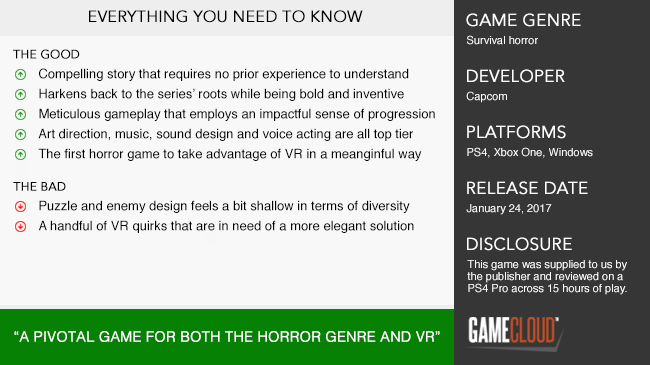
I’ll say this about Capcom, they’ve got guts. If you had told me this time last year Resident Evil was going to reinvent itself again and make a huge comeback, I probably would have laughed. And yet, against all odds, that’s exactly what they’ve managed to achieve with Resident Evil 7: Biohazard. Not only is RE7 an excellent survival horror game that harkens back to the series’ roots, it’s bold and inventive, and serves as a reminder to the horror genre at large that you don’t have to abandon combat to make a game frightening. It’s also perhaps the most important VR game released to date, too, delivering a level of immersion you need to experience first-hand to fully comprehend. When looking back on 2017 in years to come, there is no doubt in my mind that RE7 will be regarded as a pivotal moment for the horror genre. It’s not a perfect game, admittedly, but it is a damn good one. If you’ve been starved for scares, look no further.











